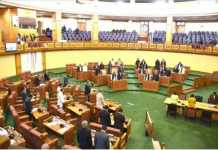The relevance of the “Look East Policy” now “Act East Policy” can also be seen very much as India reassessing its security concerns vis-a-vis the Northeast. The government’s seriousness in taking this policy forward, and without skirting the Northeast, therefore will also be a measure of how much the Union has changed its attitude towards the Northeast. So far, practically every policy vis-a-vis the Northeast have been seen through India’s the security prism. In the chicken and egg conundrum, security had always been placed ahead of development in much of the seven decades of India’s independence, so much so that development has always been seen as a by-product of the country looking after its security needs. All this while, roads were made, airfields were developed, bridges were constructed, all with an eye to servicing security needs first. Even the NEC for a long time had a charter spelling out this approach in black and white, whereby it was made mandatory for all development work in the Northeast to be linked to security needs. There is ample proof of the physical manifestation of this outlook too. A comparison between the road network before and after the Indo-Chinese war in 1962 in Arunachal Pradesh should pronouncedly establish this. A lot has changed ever since, and today the chicken and egg cycle is beginning to turn, although, the old hangover still afflicts many neo-conservative policy makers. As a border region, to some extent this is understandable, but 70 years after independence, it is time for a paradigmatic shift. This need for a change in policy stance was nowhere better expressed than by a former DoNER minister, Mani Shankar Aiyer in a seminar a decade ago, after he had just returned from a trip to China’s peripheral Yunnan province. Reflecting and lamenting on the developmental strides Yunnan had taken ahead of the Northeast, he had said, as in Yunnan, there can be no better security guarantee for India in its Northeast region than for the region to prosper and shine, and better still if it shines much brighter than its immediate neighbours across the international border.
If this approach were to be adopted, rather than development being made to dovetail security concerns, development would lead. The assumption is, this would quite naturally, without any need for further orchestration, take care of the security needs in the Northeast. Right now the scenario is quite the opposite. The Northeast looks at its own state of stagnation and then at the pace of development that has happened in neighbouring South East Asia and East Asia, and have little more to say than to sigh in exasperation and frustration. The unfavourable contrast also feeds to a sense of alienation from the Indian mainstream setting off the familiar unhealthy cycles of discontent amongst many in the Northeast on one side, and reciprocally a suspicion of disloyalty to nation on the part of Union,. Hopefully, if the liberal camp prevails over the neo-conservatives, and this trend is successfully reversed, the Northeast region can begin to shine, and as the former DoNER minister had said, this indeed could be the circumstance where development becomes the best guarantee for India’s security concerns in the Northeast region.
On a much smaller canvas, this liberal paradigm should also have very profound applications in the vexed issue of Manipur’s territorial integrity. The insecurities that complicate the Indian state’s security concerns in the Northeast, is very much at play in Manipur insecurity about a bifurcation of its territory. If the neighbours begin to shine and Manipur alone continues to stagnate, or even decelerate on the development scale as it does seem to be at the moment, its own insecurity about territorial as well as emotional integrity would be up against an ever growing challenge. The thrust of the Manipur government hence should be on ensuring equitable development. If the hill districts feel neglected and alienated, the tendency will be for centrifugal forces to grow in magnitude with each passing day. Moreover, if the neighbours are marching ahead on the development hierarchy, they would become counter magnates adding to the sum total of this centrifugal pull. Let the policy makers in Manipur too reverse the security-development equation. Build roads, fan out government infrastructures away from Imphal to the districts, bring in all round development, let the whole state partake in availing the benefits of the system. Territorial and emotional integrity should follow automatically. Once this objective is achieved, a lot many other festering problems of the state too should begin seeing light at the end of the dark tunnel they have been in for all these decades.
Source: Imphal Free Press



